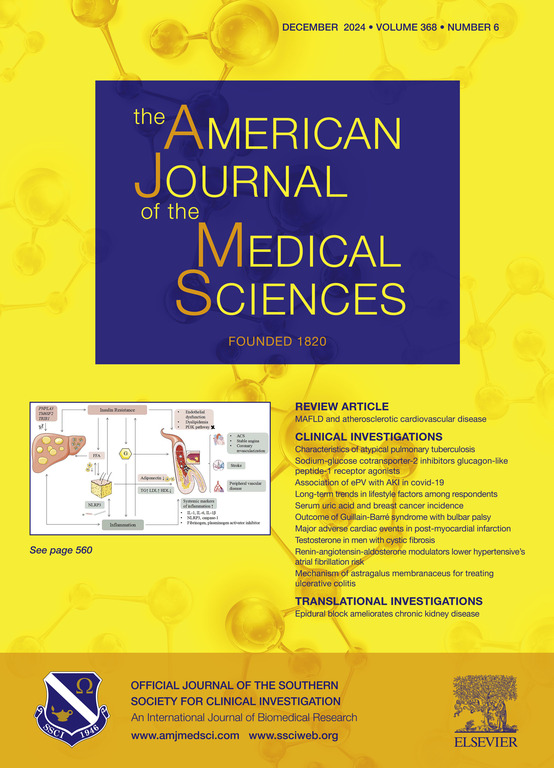蛋白质能量营养不良与哮喘住院患者较差的临床结果相关:一项全国性分析
IF 2.3
4区 医学
Q2 MEDICINE, GENERAL & INTERNAL
引用次数: 0
摘要
背景:一些研究强调了营养不良对患有各种疾病的个体的负面临床影响,包括与呼吸系统有关的疾病。本研究旨在探讨蛋白质-能量营养不良与哮喘恶化之间的关系。方法:回顾性检索2018-2021年全国住院患者样本(NIS)。我们使用ICD-10编码检索NIS中以哮喘加重(AE)为主要诊断,以蛋白质能量营养不良(PEM)为次要诊断的成年住院患者。主要结局指标为住院患者死亡率,次要结局指标为住院时间(LOS)、呼吸衰竭(RF)几率、心脏骤停、气胸、需要有创机械通气、需要ECMO和医疗成本利用(由总住院费用定义)。应用多元逻辑分析和泊松回归分析来估计相关性。结果:共有325510例AE患者入院,其中2965例(0.91%)有潜在的PEM。PEM队列的死亡率增加(aOR为3.70,p)。结论:我们的研究表明,蛋白质能量营养不良与哮喘住院期间死亡率增加和不良临床结果相关。pem还有助于提高医疗保健资源的利用率。本文章由计算机程序翻译,如有差异,请以英文原文为准。
Protein energy malnutrition is associated with worse clinical outcomes in asthma hospitalization: A nationwide analysis
Introduction
Several studies have highlighted the negative clinical impact of malnutrition in individuals with various disease conditions, including diseases related to the respiratory system. Our study sought to investigate the relationship between protein-energy malnutrition and asthma exacerbation.
Methods
We retrospectively searched the National Inpatient Sample (NIS) from 2018 to 2021. We searched the NIS for adult patients hospitalized with asthma exacerbation (AE) as the principal diagnosis and protein energy malnutrition (PEM) as a secondary diagnosis using ICD-10 codes. The primary outcome measures were inpatient mortality, while the secondary outcomes were length of stay (LOS), odds of respiratory failure (RF), cardiac arrest, pneumothorax, need for invasive mechanical ventilation, need for ECMO and health cost utilization, defined by total hospitalization costs. Multivariate logistic and Poisson regression analyses were applied to estimate the correlations.
Results
A total of 325,510 patients were admitted for AE, 2,965 (0.91 %) of whom had underlying PEM. The PEM cohort had increased odds of mortality (aOR 3.70, p < 0.001). Similarly, the PEM cohort had increased odds of cardiac arrest (aOR 2.45, p = 0.008), pneumothorax (aOR 4.94, p < 0.001), acute respiratory failure (aOR 2.07, p = 0.001), and need for invasive mechanical ventilation (aOR 3.52, p < 0.001). The study group had a significant increase in length of stay (adjusted mean difference 3.67, p = 0.0001) and charge of care (adjusted mean difference 52,819 $, p < 0.0001).
Conclusions
Our study indicated that protein-energy malnutrition is associated with increased mortality and adverse clinical outcomes during hospitalization for asthma. PEMs also contributed to increased healthcare resource utilization.
求助全文
通过发布文献求助,成功后即可免费获取论文全文。
去求助
来源期刊
CiteScore
4.40
自引率
0.00%
发文量
303
审稿时长
1.5 months
期刊介绍:
The American Journal of The Medical Sciences (AJMS), founded in 1820, is the 2nd oldest medical journal in the United States. The AJMS is the official journal of the Southern Society for Clinical Investigation (SSCI). The SSCI is dedicated to the advancement of medical research and the exchange of knowledge, information and ideas. Its members are committed to mentoring future generations of medical investigators and promoting careers in academic medicine. The AJMS publishes, on a monthly basis, peer-reviewed articles in the field of internal medicine and its subspecialties, which include:
Original clinical and basic science investigations
Review articles
Online Images in the Medical Sciences
Special Features Include:
Patient-Centered Focused Reviews
History of Medicine
The Science of Medical Education.

 求助内容:
求助内容: 应助结果提醒方式:
应助结果提醒方式:


